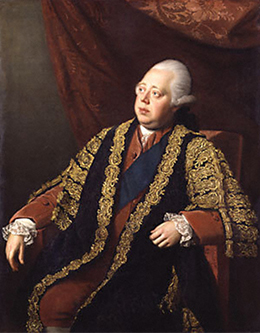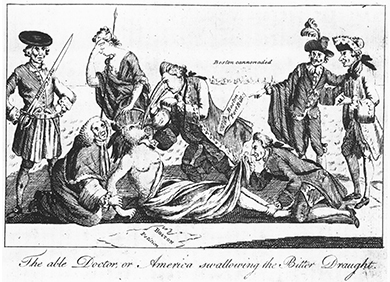| << Chapter < Page | Chapter >> Page > |
On December 16, just as the Dartmouth ’s deadline approached, townspeople gathered at the Old South Meeting House determined to take action. From this gathering, a group of Sons of Liberty and their followers approached the three ships. Some were disguised as Mohawks. Protected by a crowd of spectators, they systematically dumped all the tea into the harbor, destroying goods worth almost $1 million in today’s dollars, a very significant loss. This act soon inspired further acts of resistance up and down the East Coast. However, not all colonists, and not even all Patriots, supported the dumping of the tea. The wholesale destruction of property shocked people on both sides of the Atlantic.
To learn more about the Boston Tea Party, explore the extensive resources in the Boston Tea Party Ships and Museum collection of articles, photos, and video. At the museum itself, you can board replicas of the Eleanor and the Beaver and experience a recreation of the dumping of the tea.
In London, response to the destruction of the tea was swift and strong. The violent destruction of property infuriated King George III and the prime minister, Lord North ( [link] ), who insisted the loss be repaid. Though some American merchants put forward a proposal for restitution, the Massachusetts Assembly refused to make payments. Massachusetts’s resistance to British authority united different factions in Great Britain against the colonies. North had lost patience with the unruly British subjects in Boston. He declared: “The Americans have tarred and feathered your subjects, plundered your merchants, burnt your ships, denied all obedience to your laws and authority; yet so clement and so long forbearing has our conduct been that it is incumbent on us now to take a different course. Whatever may be the consequences, we must risk something; if we do not, all is over.” Both Parliament and the king agreed that Massachusetts should be forced to both pay for the tea and yield to British authority.

In early 1774, leaders in Parliament responded with a set of four measures designed to punish Massachusetts, commonly known at the Coercive Acts . The Boston Port Bill shut down Boston Harbor until the East India Company was repaid. The Massachusetts Government Act placed the colonial government under the direct control of crown officials and made traditional town meetings subject to the governor’s approval. The Administration of Justice Act allowed the royal governor to unilaterally move any trial of a crown officer out of Massachusetts, a change designed to prevent hostile Massachusetts juries from deciding these cases. This act was especially infuriating to John Adams and others who emphasized the time-honored rule of law. They saw this part of the Coercive Acts as striking at the heart of fair and equitable justice. Finally, the Quartering Act encompassed all the colonies and allowed British troops to be housed in occupied buildings.
At the same time, Parliament also passed the Quebec Act, which expanded the boundaries of Quebec westward and extended religious tolerance to Roman Catholics in the province. For many Protestant colonists, especially Congregationalists in New England, this forced tolerance of Catholicism was the most objectionable provision of the act. Additionally, expanding the boundaries of Quebec raised troubling questions for many colonists who eyed the West, hoping to expand the boundaries of their provinces. The Quebec Act appeared gratuitous, a slap in the face to colonists already angered by the Coercive Acts.
American Patriots renamed the Coercive and Quebec measures the Intolerable Acts . Some in London also thought the acts went too far; see the cartoon “The Able Doctor, or America Swallowing the Bitter Draught” ( [link] ) for one British view of what Parliament was doing to the colonies. Meanwhile, punishments designed to hurt only one colony (Massachusetts, in this case) had the effect of mobilizing all the colonies to its side. The Committees of Correspondence had already been active in coordinating an approach to the Tea Act. Now the talk would turn to these new, intolerable assaults on the colonists’ rights as British subjects.

The colonial rejection of the Tea Act, especially the destruction of the tea in Boston Harbor, recast the decade-long argument between British colonists and the home government as an intolerable conspiracy against liberty and an excessive overreach of parliamentary power. The Coercive Acts were punitive in nature, awakening the worst fears of otherwise loyal members of the British Empire in America.

Notification Switch
Would you like to follow the 'U.s. history' conversation and receive update notifications?